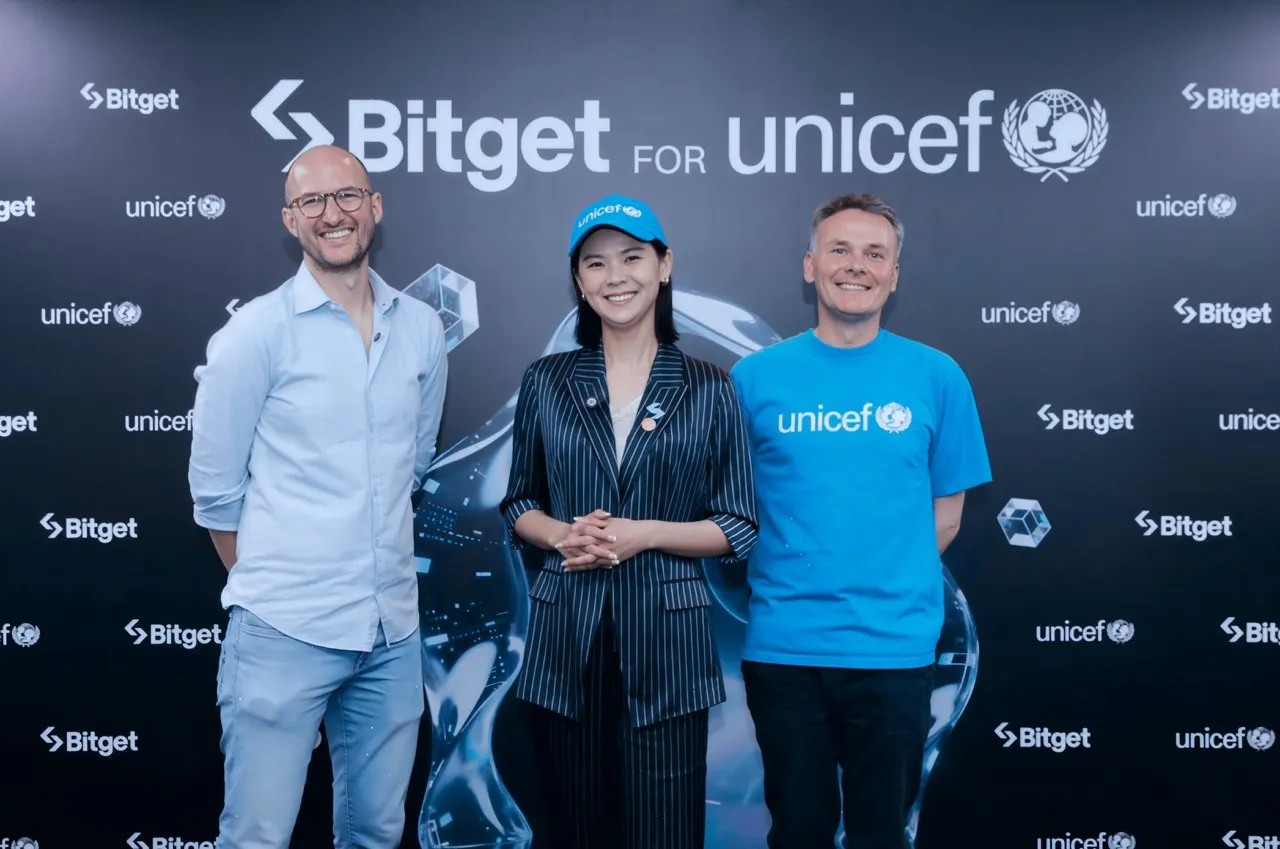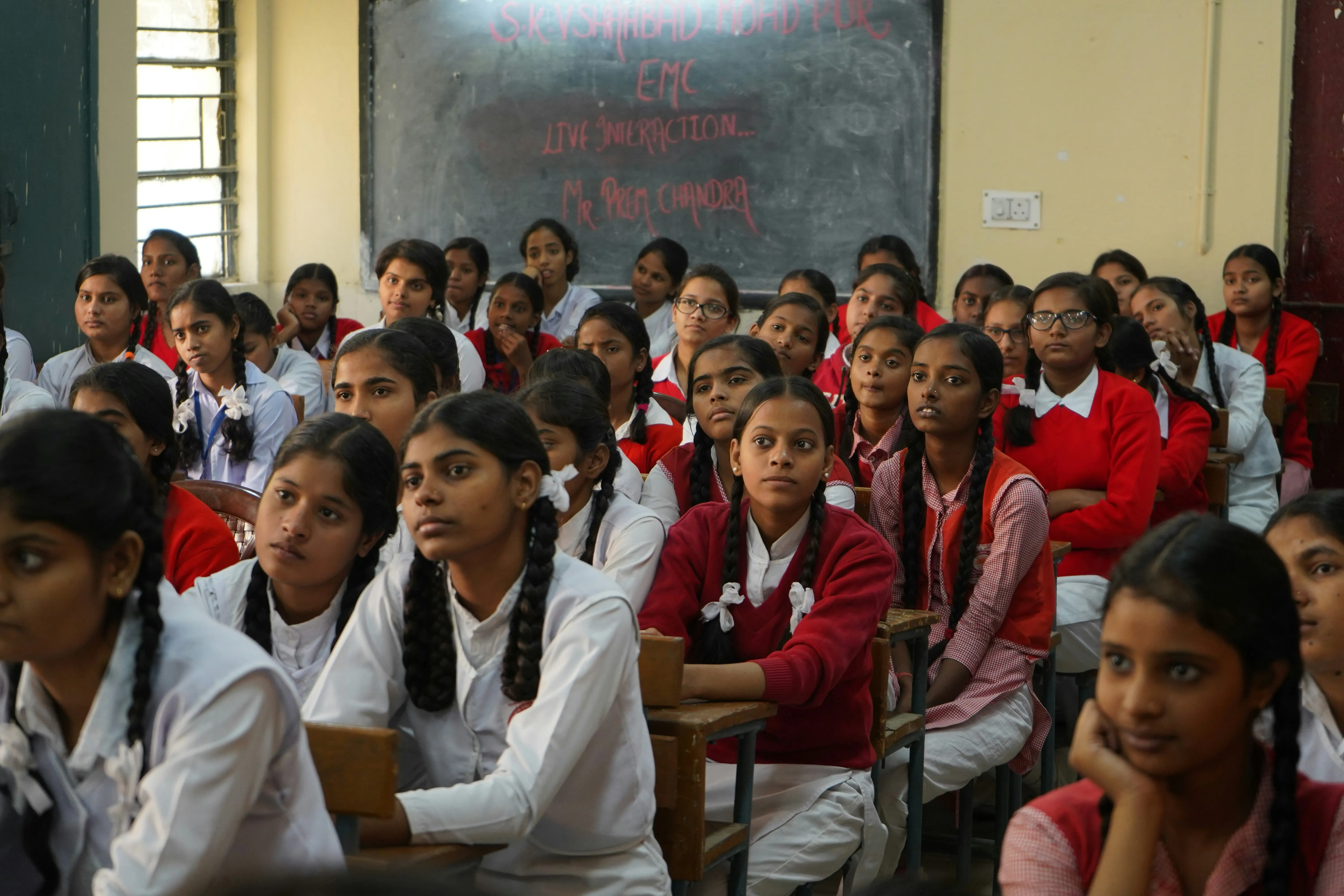Bitget joins UNICEF to educate girls in web3
Gaming-inspired workshops across Armenia, Kazakhstan, and Malaysia help students become creators in the digital economy

In a male-dominated industry, a female-led exchange is launching a program to give girls a head start in blockchain.
A major new partnership between crypto exchange Bitget and UNICEF’s Game Changers Coalition aims to tackle the global gender gap in digital skills. Announced this week, the three-year collaboration will reach 300,000 learners across eight countries, focusing on blockchain education and STEAM skills for adolescent girls and young women.
A mission driven by personal experience

Leaders from Bitget and UNICEF are joining forces to close the gender gap in blockchain education through a three-year global initiative. Photo: Bitget
Bitget CEO Gracy Chen opened the announcement by sharing a story about growing up with a single mother studying for her MBA while working full-time.
"My childhood was very much like a mini MBA already. MBA stands for Master of Basic Autonomy. Lesson one, if you want noodles, you better learn to cook them yourself," she joked.
That experience shaped her views on education. “My mom did teach me three important lessons. One, independence. Two, going after what you want. Three, how essential it is to get an education,” Chen said.
“Researchers have shown that educating women and girls is key to changing communities for the better and even to increasing a country's GDP, and that's why I was so excited to partner with UNICEF and join the Game Changers Coalition.”
Women in web3 remain underrepresented
The crypto and blockchain industries remain heavily male-dominated. Bitget stands out, according to Chen, who said: “We're the only top 10 exchange with a female CEO. And number two, actually, more than half of our management at Bitget are women. And you know, more than half women in crypto. That's like finding a Bitcoin wallet that didn't get lost in a boating accident. Rare, but glorious.”
This isn’t the company’s first step into gender-focused initiatives. “In January 2024 we launched the educational initiative Blockchain4her with a $10 million commitment in scholarship and mentorship,” she said.
Global strategy with local engagement

Bitget and UNICEF’s partnership aims to equip young girls in India with blockchain knowledge and future-ready digital skills. Photo: Unsplash / Yogendra Singh
The initiative will operate across Armenia, Brazil, Cambodia, India, Kazakhstan, Malaysia, Morocco, and South Africa. Paul Heber of UNICEF Luxembourg emphasized the importance of tailoring the program to different regions.
“There’s a very holistic approach of UNICEF... sometimes the mix needs to be different,” he said. “The coalition aims to reach 300,000 learners, including girls and their direct environment (teachers, mentors, parents). The goal is to ensure long-term impact, including parents and wider family members.”
Heber added that being based in the small country of Luxembourg has its advantages. “Being small really lets us move quickly. We think globally. We are forced to. And we build bold ideas from the ground up.”
Teaching blockchain through play and participation
The curriculum aims to teach basic blockchain concepts using accessible tools and formats. Chen described plans for sessions on stablecoins, regulations, and the structure of blockchains: “What does a block even mean, and how does a chain look like.”
The program embraces a learning model rooted in gaming, creativity, and interaction. “Their motto is from playing to learning to earning. We see each other very aligned on this philosophy that we don't want this educational program to be one way,” said Chen.
Heber reinforced that approach: “The Game Changers Coalition is all about getting girls to code and use that in a fun way to get them to develop their skills, to get into touch with those digital skills.”
UNICEF has long worked with gaming platforms and companies to create engaging educational environments. The coalition’s second pillar, “building the game,” focuses on helping girls move from being game consumers to becoming creators – encouraging coding, design, and innovation from an early age.
Chen noted that gamified hackathons will be part of the hands-on approach, with children as young as 12 or 14 joining the action. While not as technically advanced as professional events, the aim is to spark interest and build confidence.
Addressing the digital gender gap
The project responds to a significant gap in access and investment for women in tech. “Less than 10% of private capital is going towards women-founded and women-led businesses,” said Sunita Grote of UNICEF’s Office of Innovation. “That has an impact on the kinds of solutions and technologies that we see.”
Chen highlighted how blockchain could provide accessible financial tools. “They don't need to have a bank account, and don't need a bank to open a wallet account or an exchange account if you need to trade,” she said, adding: “It's not our goal to teach them trading... it's more of our goal to be educational and share about blockchain technology.”
Grote added that UNICEF has already been exploring blockchain for humanitarian work. “Blockchain and digital assets can improve our ability to reach communities during emergencies... and provide really exciting ways of improving access to capital for young entrepreneurs.”
Building skills and communities

The initiative focuses on building lasting communities, helping girls support each other as they grow into confident participants in the digital economy. Photo: Unsplash / Kylie Lugo
Beyond technical learning, the partnership encourages collaboration. “All these women and girls we've helped to educate and bring into the crypto space can build a community with each other to amplify the impact of their newfound understanding,” said Chen.
UNICEF is also focused on child safety in digital spaces. “You need to make sure that there’s safeguarding in place, that kids remain protected and are not exposed to things they shouldn't be exposed to,” Heber said.
By combining real-world tech training with creative tools and peer support, the program aims to equip girls with the confidence and knowledge to pursue digital opportunities.
A model for inclusive innovation
For Bitget and UNICEF, the goal is to ensure young women are part of shaping the future of tech. “UNICEF is trying to close the gender skills gap that we're seeing among adolescent girls,” said Grote.
The broader message is one of inclusion through innovation. As Chen put it: “Bitget and UNICEF both understand that educating and empowering women and girls, especially when it comes to STEAM, is the key to building a world that is better for all of us.”



